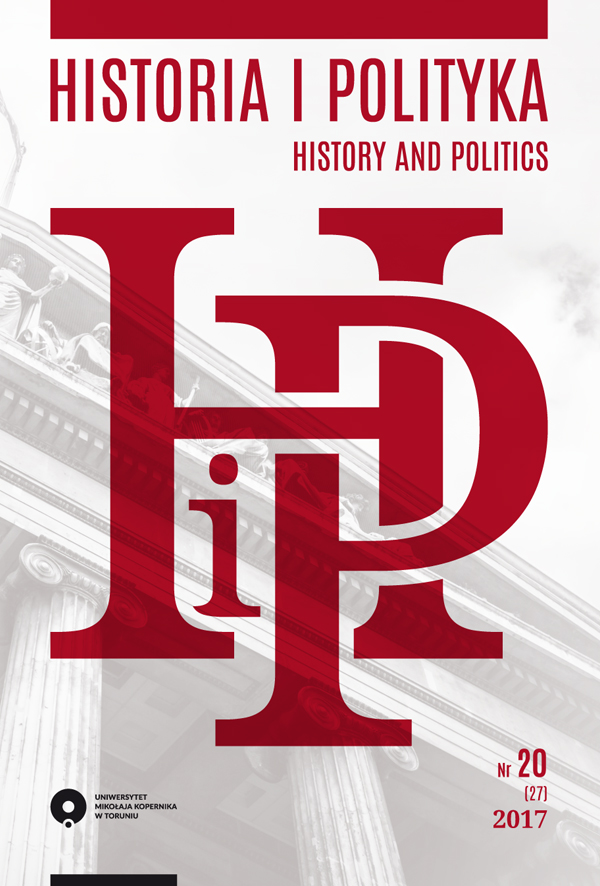Hungarian Turanism. From the Birth of the Ideology to Modernity – an Outline of the Problem
DOI:
https://doi.org/10.12775/HiP.2017.011Słowa kluczowe
Jobbik, nationalism, Hungarian nationalism, Turanism, HungaryAbstrakt
This article is an outline of Hungarian Turanism, Central European ideological phenomenon. The ideology was relatively important in Hungary during the first half of the 20th century and is currently undergoing a revival in the country. Turanism is a very important part of the ideology promoted by the Jobbik party (Movement for a Better Hungary). The term “Turanism” is derived from Turán, a word most likely of Old-Persian origin, once used to describe the lands of Central Asia inhabited by nomadic tribes. According to the ideology of Turanism, Hungarians are related to Altaic peoples, such as Turks, Azeris, Tatars, Kazakhs, Mongols, and even Tibetans and Japanese. Many Hungarian researchers and explorers travelled to Central Asia in order to find peoples related to Hungarians. It is noteworthy to point out that modern Hungarian Turanism, particularly as it is represented by Jobbik, displays strong anti-Western attitudes. Jobbik is very critical of the international policy of the European Union and the United States, and considers Hungary to be a victim of the West. What is more, Jobbik strongly criticises globalism, liberalism and anti-traditionalism, which it considers to be features of modern Western societies. Because of this, Jobbik’s “Eastern Turn” appears to be a turn away from the West.
Bibliografia
Ablonczy, B. (2005). Teleki Pál. Budapest: Osiris.
Aisch, G., Pearce, P., Rousseau, B. (2016). How Far Is Europe Swinging to the Right. Derived from: http://www.nytimes.com/interactive/2016/05/22/world/europe/europe-right-wing-austria-hungary.html?_r=0.
Akçalı, E., Korkut, U. (2012). Geographical Metanarratives in East-Central Europe: Neo-Turanism in Hungary. Eurasian Geography and Economics, 53 (5), 596–614.
A kezdetek: A Jobbik megalakulása. Derived from: https://jobbik.hu/jobbikrol/kezdetek-jobbik-megalakulasa.
A Kőrösi Csoma Társaság honlapja. Derived from: http://www.kcst.hu/.
A Short Summary About Jobbik. (2010). Derived from: http://jobbik.com/short_summary_about_jobbik.
Budenz, J. (1881). Magyar-ugor összehasonlító szótár. Budapest: Magyar Tudományos Akademia.
Chomsky, N. (2011). Is the World Too Big to Fail?. Derived from: http://www.salon.com/2011/04/21/global_empire_united_states_iraq_noam_chomsky/.
Fidesz-MSZP összefogás a turáni népek ellen. (2013). Derived from: http://alfahir.hu/node/121861.
“Finn-ugor” tanok és a madjar Belső-Ázsia. (2009). Derived from: http://kurultaj.hu/2009/10/finn-ugor-tanok-es-a-madjar-belso-azsia/.
Gabor Vona: Europe Kept Silent – Intervew. (2010). Derived from: http://www.jobbik.com/gabor_vona_europe_kept_silent_-_interview.
Габор Вона: евроатлантизм должен быть заменен на евразийство. Derived from: http://www.geopolitica.ru/article/gabor-vona-evroatlantizm-dolzhen-byt-zamenen-na-evraziystvo#.V5is-1SLTIU.
Gyöngyösi, M. (2011). Statement of Jobbik Against Accusations re Breivik-Case. (2011). Derived from: http://jobbik.com/statement_jobbik_against_accusations_re_breivik-case.
Horváth, Á. (2013). “Mindkét országnak kötelessége küzdeni területeiért” – Gyöngyös azeri testvérvárosa. Derived from: http://alfahir.hu/node/123662.
Information. Kurultaj – tribal assembly of the Hun-Turkic nations, celebration of the preservation of the ancient traditions. Derived from: http://kurultaj.hu/english/.
Jobbik Expresses Solidarity with Brotherly Azeri Nation. (2013). Derived from: http://jobbik.com/jobbik_expresses_solidarity_brotherly_azeri_nation.
Kárpátia – Kun miatyánk. Derived from: http://www.zeneszoveg.hu/dalszoveg/50449/karpatia-/kun-miatyank-zeneszoveg.html.
Kárpátia – Turul. Derived from: http://www.zeneszoveg.hu/dalszoveg/56666/karpatia-/turul-zeneszoveg.html.
Kessler, J. (1967). Turanism and Pan-Turanism in Hungary: 1890–1945. (Ph.D. thesis). Berkeley: University of California.
Kirgiz-magyar együttműködés a hagyományőrzésben. (2016). Derived from: http://kurultaj.hu/2016/06/kirgiz-magyar-egyuttmukodes-a-hagyomanyorzesben/.
Külügyi program. Derived from: https://jobbik.hu/programunk/kulpolitika.
Magyar díszvendégek Macedóniában, a Balkáni Törökök Nagygyűlésén. (2015). Derived from: http://kurultaj.hu/2015/03/magyar-diszvendegek-macedoniaban-a-balkani-torokok-nagygyulesen/.
Magyarország először vett részt a Türk Világ Kulturális Fővárosának díszünnepségén. (2015). Derived from: http://kurultaj.hu/2015/01/magyarorszag-eloszor-vett-reszt-a-turk-vilag-kulturalis-fovarosanak-diszunnepsegen/.
Magyar-Turán Alapítvány – életképek. (2015). Derived from: http://kurultaj.hu/2015/11/magyar-turan-alapitvany-eletkepek/.
Nemzeti néppárt. (2016). Derived from: https://jobbik.hu/hireink/nemzeti-neppart.
Országgyűlési képviselők választása. (2014). Derived from: http://valasztas.hu/hu/ogyv2014/861/861_0_index.html.
Paikert, A. (1913). Ázsia jövője. Turán, 1(1), 7–14.
Phillips, L. A Far-Right for the Facebook Generation: The Rise and Rise of Jobbik. (2010). Derived from: https://euobserver.com/political/29866.
Rajabova, S. (2013). Azerbaijani Occupied Town Twinned with Hungary's Tiszavasvari. Derived from: http://www.azernews.az/azerbaijan/55146.html.
Rev, I. (2015). Hungary’s Politics of Hate. Derived from: http://www.nytimes.com/2015/09/26/opinion/hungarys-politics-of-hate.html.
Sándor Kőrösi Csoma élete. Derived from: http://csoma.mtak.hu/hu/csoma-elete.htm.
Szendrei, L. (2010). A turanizmus: definíciók és értelmezések 1910-től a II. Világháborúig. Máriabesnyő-Gödöllő: Attraktor.
The Background of Real Conflict in the World. (2013). Derived from: http://jobbik.com/background_real_conflict_world.
The Editors of Encyclopædia Britannica. (1998). Pan-Turanianism. Derived from: http://www.britannica.com/EBchecked/topic/440695/Pan-Turanianism.
Turánia. Derived from: http://www.turania.hu/catalog/index.php.
Turán konferencia Konya városában. (2015). Derived from: http://kurultaj.hu/2015/10/turan-konferencia-konya-varosaban/.
Turmezei, L. (1935). A turáni sajtóiroda és története. Budapest: Magyarországi Turánok Baráti Köre.
Vámbéry, A. (1882). A magyarok eredete: ethnologiai tanulmány. Budapest: A Magyar Tudományos Akadémia Könyvkiadó Hivatala.
Vona Gábor a Lomonoszov Egyetemen tartott előadást. (2013). Derived from: https://jobbik.hu/hireink/vona-gabor-lomonoszov-egyetemen-tartott-eloadast.
Vona Gábor: az eurázsiai jövő alapja a tradíció. (2013). Derived from: http://alfahir.hu
/vona_gabor_az_eurazsiai_jovo_alapja_a_tradicio.
Zalan, E. (2014). Court Rules Jobbik Cannot Be Called “Far-right”. Derived from: https://euobserver.com/eu-elections/124509.
Pobrania
Opublikowane
Jak cytować
Numer
Dział
Licencja
Uniwersytet Mikołaja Kopernika w Toruniu respektuje prawo do prywatności i ochrony danych osobowych autorów.
Dane autorów nie są wykorzystywane w celach handlowych i marketingowych. Redaktorzy i recenzenci są zobowiązani do zachowania w poufności wszelkich informacji związanych ze złożonymi do redakcji tekstami.
Autor, zgłaszając swój tekst wyraża zgodę na wszystkie warunki i zapisy umowy licencyjnej (określającej prawa autorskie) z Uniwersytetem Mikołaja Kopernika w Toruniu.
Statystyki
Liczba wyświetleń i pobrań: 630
Liczba cytowań: 0



